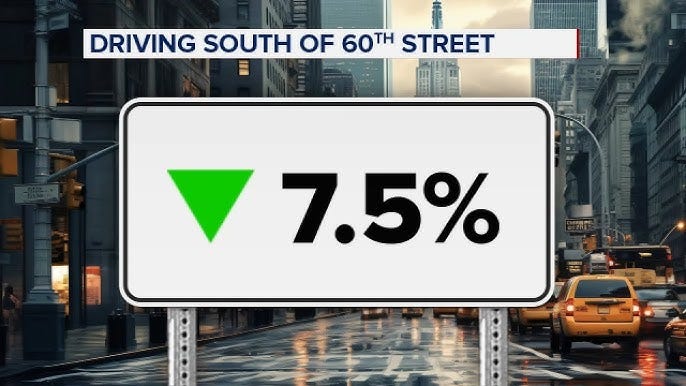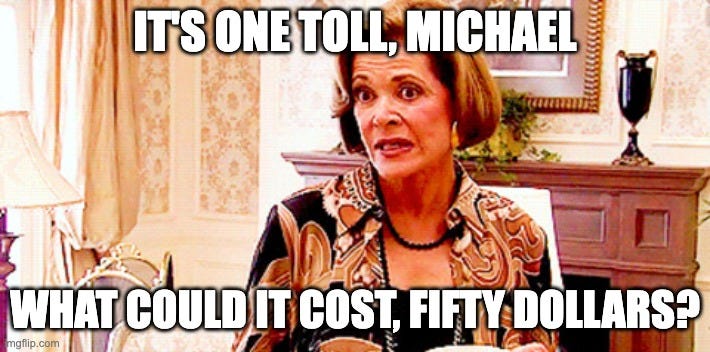👁️ Congestion Pricing is Everyone's Business (Apparently)
Plus Elon Musk's shameful Diablo cap; FDIC Spying on Critics; Robert Kiyosaki: Rich Dad, Deranged Dad
I live in New York, and I’m a vocal booster of the brand of urbanist socialism practiced here. I love paying taxes because (despite endemic corruption) they go to make the place I live much, much better than most cities in the U.S. So it’s entertaining when people who don’t live here have passionate opinions about crime, the subways, or this week - charging people to drive on the most in-demand roadways in the United States. First, some news.

Is the FDIC Monitoring Critics?
According to a pseudonymous Twitter account, banking regulators are assembling dossiers on outspoken critics of “Chokepoint 2.0,” an alleged undisclosed initative to restrict crypto firms access to banking … which the current administration insists does not exist.
Elon Musk is Lying about Being Good at Video Games
I for one and shocked, shocked that The Most Honest Man in the World hired someone to power-level him in a game he doesn’t actually know how to play, then bragged about being among the best in the world at it. That’s definitely a person I want to bet on with the future of my personal investments, and the U.S. economy as a whole.
Neil Gaiman is a Deranged Maniac in a Nice-Guy Skin Suit
It seems unlikely that anyone could have missed it, but New York’s further reporting on the Gaiman allegations is maybe the most harrowing piece of nonfiction I’ve ever read. It is frankly stomach-turning - and somehow deeply revealing of the particular vibe of friendly nerd that Gaiman and Amanda Palmer have been performing in public for decades, while in fact being barely distinguishable from Ghislaine Maxwell and Jeffrey Epstein.
Rich Dad, Poor Dad is A Deranged Vision of the Trump Economy
I’ve recently discovered the excellent YouTube channel Financial Diet, and I highly recommend their discussion of Robert Kiyosaki’s Rich Dad, Poor Dad, a financial advice book seemingly consisting mostly of hallucinations. The book is a bestseller largely thanks to its association with pyramid schemes multi-level marketing firms like Amway, and it contains no advice about succeeding in a career, careful investing, or budgeting. Instead, it’s about finding the right grift to make you a millionaire by tricking other people into working for you.
Decongestion
The past three or four years has been a peak period for turning New York City’s municipal problems into political red meat for the rest of America. It’s an odd feeling for someone who lives here, because the hysteria basically never matches anything that’s happening in the headlines or on social media. While New York has always been central to American political and social discourse, I suspect that the decline of local news has left people online little choice but to discuss their political ideals through a Big Apple-shaped lens. It’s like the rest of America is Malaysia, and I’m hearing way too much about my own business from millions of Ian Miles Cheongs.
This particular wave of NYC Hysteria started during COVID, with New York’s lockdowns becoming a proxy for the broader political debate. That carried forward into a wave of crime paranoia, despite the fact that New York is still one of the safest cities in America. That in turn became the bizarre meme of right-wing Manly Men crying like babies about how scared they are of the NYC subway (which they’ve never ridden).
This sheer terror of public transit, itself the product of a long-term ideological campaign against anything publicly funded and collectively shared, has now rolled over into utterly unhinged discourse about New York’s newly-implemented congestion pricing for traffic into Manhattan. The sheer ignorance is staggering, but the emotional intensity - the sense of aggreived woundedness from certain corners - is even more fascinating, revealing, and frequently hilarious. My favorite reaction so far is Steven Fulop, Mayor of Jersey City, threatening to impose “reverse congestion pricing” on people who drive there from Manhattan. Okay, Jan.
The basics of congestion pricing are simple: If you drive a passenger car into Lower or Midtown Manhattan between morning and 9pm, you pay a toll of $9 for the day. Trucks or buses pay $15-$25 - again, crucially, a one-time fee for the entire day. Taxis and App-hired cars pay smaller per-trip tolls of 75 cents or $1.50.
If you’ve ever driven through midtown, which I was once stupid enough to do in a moving truck, you will realize that if anything these numbers are too low.
It has been hilarious to watch Twitter jug-hooters (read: probably preteens in the Phillipines) talk endlessly about how this is going to destroy night life and theater in New York, when it unironically costs roughly $250 per person for drinks, dinner, and a theatre ticket to anything in Manhattan. Paying nine bucks for a better driving experience would have most actual New Yorkers begging Kathy Hochul to shut up and take their money.
Just one of the absurdities here is that congestion pricing is an attempt to do something conservatives should broadly support: using price mechanisms to control the consumption of goods through the market. The pricing isn’t dynamic, but the basic framework is in fact deeply conservative: If your drive into Manhattan isn’t worth $9 to you, don’t drive. That leaves the resources for use for a more economically productive end, doesn’t it?
A superficially compelling counterargument is that the fee disadvantages working people. That’s obviously not so compelling from people who would gladly use actual working-class New Yorkers as fertilizer, but more substantively, it’s based on staggering ignorance of how New York works. There is functionally no free parking in Manhattan, so most people driving in are already pot committed to about $40 in parking costs per 8 hours (I don’t drive, but I’m going on signs here). Which is why people in service jobs in Manhattan already don’t do that, they either take the train from elsewhere in the city, or drive from an outer borough to a park-and-ride. And to reiterate, even people who do have to drive in will likely save in time and stress what they’re handing over in added cash.
Add to that that the program is expected to generate anywhere from $500 million to $3.4 billion a year for the MTA’s capital improvement fund, and brother, I’m happier than a pig in shit over here.
Of course, funding public transportation is one of the real reasons people are so mad about this - or at least, one reason they’re being told to be mad. It’s clear there are marching orders out to right-wing media, whose more basic message seems to be the classic reactionary mindset trope of unintended consequences: The masses must be convinced that politics and regulation do not work, and that any effort to reshape an awful reality like untenable traffic will inevitably make things worse, instead.
This injunction has led to all sorts of insane and nonsensical claims. On Sunday, in a particularly rich example, AB Inbev announced that it would add $5 to the price of a keg of beers like Busch and Corona because of congestion pricing, and the New York Post bought it hook, line, and sinker. Apparently nobody had the five minutes and basic arithmetic skills to notice that the charges would actually add just 7 cents to the cost of each of the 300 kegs each truck carries, even before the wages saved by the truck driver’s possibly much faster trip. The Post story also congestion pricing a “nail in the coffin” for … drinking in New York? Again - Okay, Jan.
As a radical Shoupista, though, and aside from the political metagame, I think some of the angst must be at the very simple implication underlying congestion pricing: that surface roads and on-street parking are not, in fact, a free and infinite resource that it is your birthright as an American to use for free until the end of time. The roads were and remain a collective project - socialist, you might even say - but that is a truth that cannot speak its name. In fact, it’s worth noting that New Yorkers like me who don’t drive already pay a fucking ton of money to build and maintain surface roads.
So pay your nine dollars, keep the angst, and shove it up your ass.






"
According to a pseudonymous Twitter account, banking regulators are assembling dossiers on outspoken critics of “Chokepoint 2.0,” an alleged undisclosed initative to restrict crypto firms access to banking … which the current administration insists does not exist.
"
Eh, if anything we'll get Chokepoint 2.1, which is the same with exceptions for Trump/Thiel/Munk and their allies. If that's too difficult, I doubt they will want anything involving financial accountability going on. If they can contain it, keep loyal lackies as the investigators and enforcers, then maybe. But I think it more likely their tradfi grifts would get hurt by less speculation in general than helped by the lack of competition.
Also, I believe in some balancing. More regulations for onramps/offramp if you want non-regulation/deregulation fon defi. Let the experiment continue, five FOSS devs can't afford a regulation department, but don't force mom and pop to foot the FDIC bill. It's gotta be balanced with a buck stop somewhere, otherwise in case of global conflict you got fewer non-violent options. Maybe that's okay, when/if we live in a true decentralized-ledger-for-the-world-and-all-transactions reality (which seems like an unlikely utopia right now), but when tradfi is /less/ regulated while true defi is /more/ regulated, that to me is a recipe for more shenanigans in the shadows, as for every 1 shadowy supercoders there are 100 shadowy Credit Suisse shell (company) gamers.